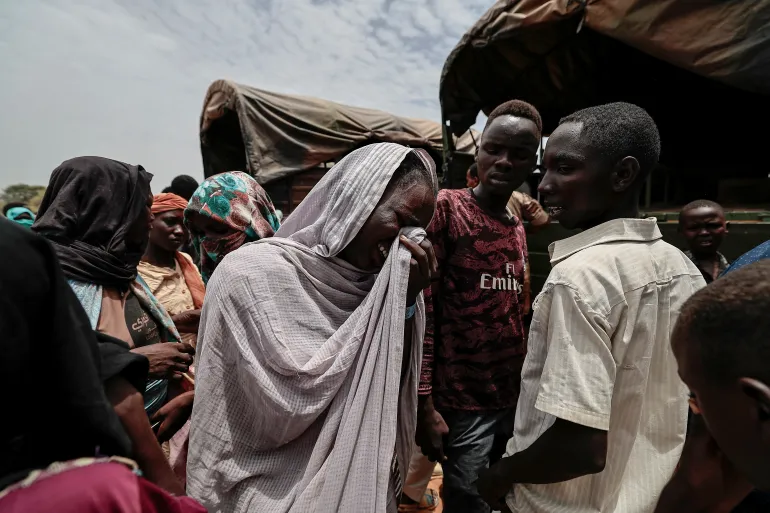

Sudanese women have always been an inspiration to me.
When the people of Sudan took to the streets to call for the ouster of President Omar Hassan al-Bashir in 2019, women were at the forefront, leading the movement for democracy and change. It was estimated that women – who have long endured marginalisation, harassment and sexual violence in Sudan – made up as many as two-thirds of the protesters. Who can forget the viral image of the young protester Alaa Salah standing atop a car in a white toub leading a chant against the regime? After four months of demonstrations, the reign of President al-Bashir was ended.
Now, in a terrible turn of events, Sudanese women are bearing the brunt of the vicious war that began in mid-April between the Sudanese Armed Forces (SAF) and the paramilitary Rapid Support Forces (RSF). More than six million people have been displaced since the new war erupted including an estimated 105,000 women who are currently pregnant, according to the United Nations. Of the 1.2 million who have fled to neighbouring countries, nearly nine in 10 are women and children. The healthcare system in Sudan is in a perilous state – 70 to 80 percent of hospitals in conflict areas are not operational – with devastating consequences for women in need of maternal health medicines.
And sexual and gender-based violence has become an epidemic. According to the World Health Organization, more than four million women and girls are at risk of sexual violence in Sudan.
While a UN experts’ report accused both parties of violations of humanitarian and human rights law, the experts expressed alarm at the brutal and widespread use of rape and other forms of sexual violence by the RSF. Some of the reported rapes appeared to be ethnically and racially motivated, the experts said, in a frightful echo of the Darfur crisis of 20 years ago.
A Human Rights Watch report found that the RSF committed a ‘‘staggering number of rapes and other war crimes’’ during attacks on West Darfur’s capital, el-Geneina, between late April and late June 2023.
The Strategic Initiative for Women in the Horn of Africa documented hundreds of cases of women who were victimised by the RSF, either forcibly disappeared while trying to flee the fighting, kidnapped for ransom, or abducted and compelled to serve as sex slaves. ”I am four months pregnant,” said a 21-year-old survivor. ”I cannot even count how many times I have been raped.”
A new UN report describes how women and girls are being abducted and held in ”inhuman, degrading slave-like condition in areas controlled by the Rapid Support Forces (RSF) in Darfur, where they are allegedly forcibly married and held for ransom.” Sources told the UN that women and girls have been seen in chains on pick-up trucks and cars.
The accounts are almost too painful to read.
I am deeply concerned by accusations about regional powers intent on worsening the situation for Sudan’s women. In particular, I have been troubled by reports that the United Arab Emirates has been supplying arms to the RSF. A prominent analyst of the Sudan crisis has described the UAE’s material support for the RSF as ‘‘the worst kept secret going right now’.’ When asked by a journalist whether the UAE is supplying arms to the RSF, the US ambassador to the UN said, ‘‘We have called for all countries who might be engaged in this war to cease those efforts.’’ The UAE has denied the accusations. I hope the reports are wrong.
It is essential that all regional and international actors play a constructive role in bringing peace to Sudan, especially at this moment when the world’s attention is focused on other crises. They must not overlook gross human rights abuses in pursuit of selfish economic and strategic interests. The UAE is proud of its standing in the world, which it seeks to highlight by hosting the United Nations Climate Change Conference – COP28 – from November 30 until December 12 at Expo City in Dubai. But its global reputation will deserve a black mark if it fails to ensure a clean break from any association with the warring parties in Sudan. The UAE has a duty to renounce and sever any ties with the criminal forces of the RSF.
When I was given the privilege of serving as president of Liberia, I assumed responsibility for rebuilding a nation nearly destroyed by war and plunder. I saw first-hand how essential women’s empowerment was in moving a country towards reconciliation.
So it must be in Sudan. Let us – all of us – contribute to that effort.
